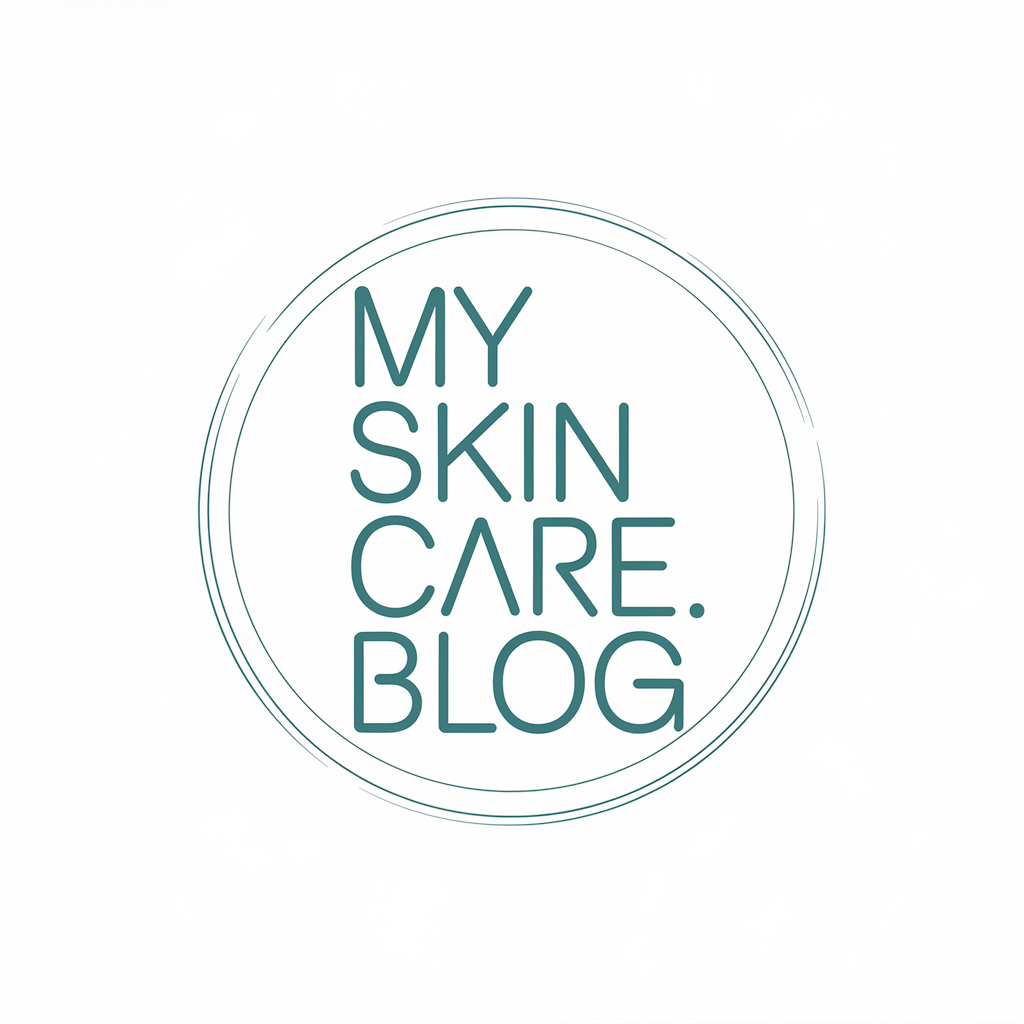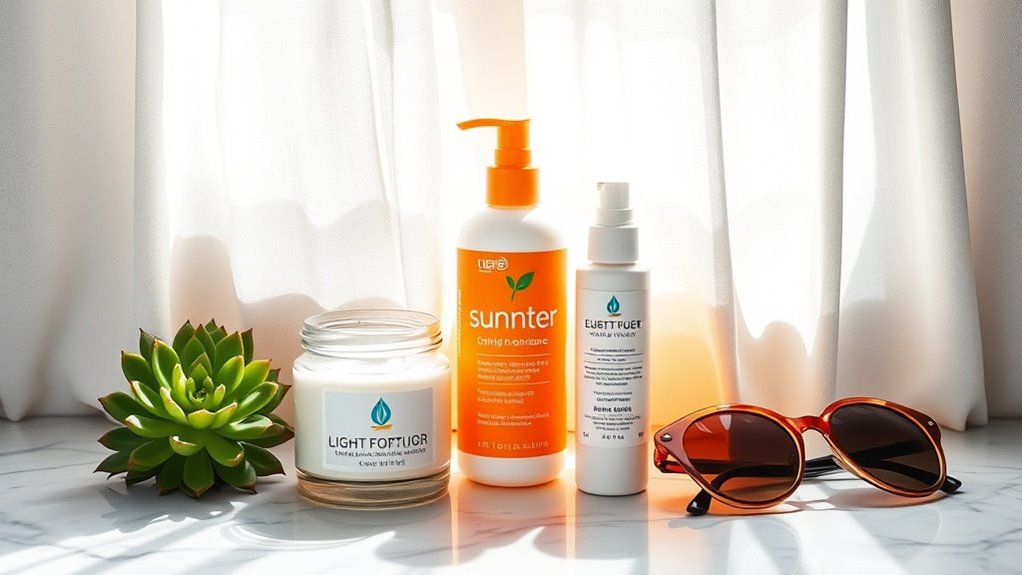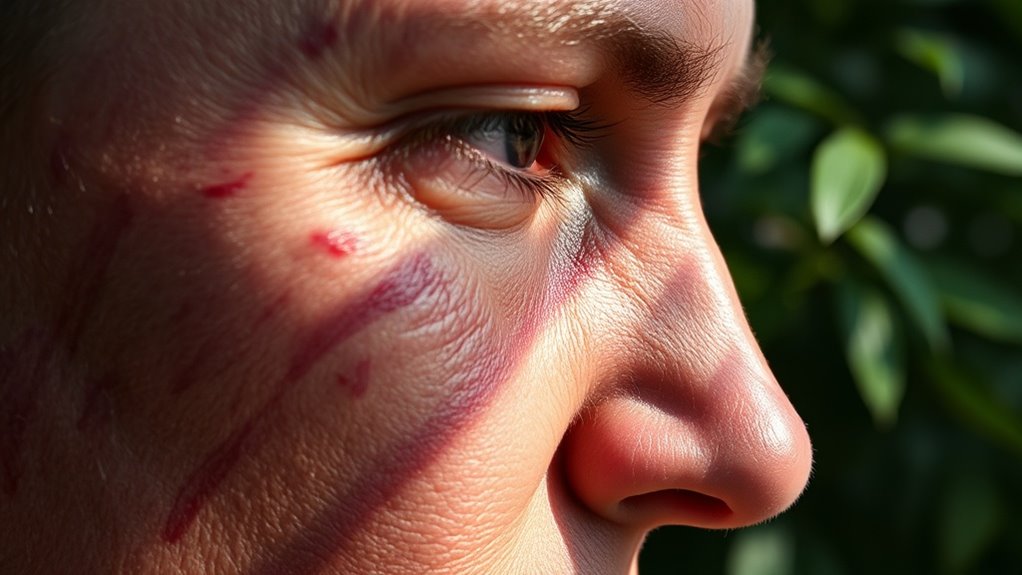How Stress Could Be the Reason for Your Latest Breakout
You might recall the ancient saying, “stress is a silent killer,” but did you know it can also wreak havoc on your skin? When you’re under pressure, cortisol levels spike, leading to increased oil production and clogged pores. This creates a breeding ground for acne-causing bacteria. Understanding how stress influences your skin’s health is vital. What if managing stress could be the key to clearer skin?
Key Takeaways
- Stress elevates cortisol levels, which stimulates sebaceous glands to produce excess oil, leading to clogged pores and breakouts.
- Increased cortisol disrupts hormonal balance, promoting oiliness and exacerbating acne flare-ups during high-stress periods.
- Stress weakens the skin’s barrier function, increasing susceptibility to irritation and inflammation, which can trigger breakouts.
- Chronic stress can impair skin healing processes, prolonging the duration and severity of acne outbreaks.
- The inflammatory response from stress can lead to visible redness and irritation, making breakouts more pronounced.
Understanding the Link Between Stress and Acne
How does stress actually impact your skin? When you experience stress, your body releases cortisol, a hormone that can trigger inflammation.
This inflammation, in turn, leads to increased oil production in your skin’s glands, heightening the risk of clogged pores. As bacteria thrive in this oily environment, it can result in breakouts and acne.
Additionally, stress may compromise your skin’s barrier function, making it more susceptible to irritation and infections. Moreover, managing psychological stress effectively can help mitigate these hormonal changes and promote healthier skin.
How Stress Triggers Hormonal Changes
When you experience stress, your body releases cortisol, a hormone that can greatly impact your skin. This hormonal surge not only contributes to acne but can also lead to an imbalance that exacerbates oil production. Understanding this connection is essential for managing breakouts effectively. Implementing overnight solutions can help mitigate stress-related skin issues and promote a clearer complexion by morning.
Cortisol and Acne Connection
Stress greatly impacts your body, particularly through the release of cortisol, a hormone that plays an essential role in regulating various physiological functions.
Elevated cortisol levels can trigger a cascade of reactions that contribute to acne.
Here’s how stress-induced cortisol affects your skin:
- Increased Oil Production: Cortisol stimulates sebaceous glands, leading to excess sebum.
- Inflammation: Higher cortisol levels can enhance inflammation, worsening acne.
- Immune Response: Stress weakens your immune response, making it harder to combat bacteria.
- Skin Repair: Elevated cortisol can slow down skin healing processes, prolonging breakouts.
Understanding this connection is essential for managing stress and skincare effectively.
Hormonal Imbalance Effects
What happens to your hormones during periods of intense stress?
Your body releases cortisol, which can disrupt the balance of other hormones like estrogen and testosterone.
Elevated cortisol levels can lead to increased androgen production, heightening your skin’s oiliness and potential for breakouts.
Additionally, stress affects insulin sensitivity, leading to fluctuations in blood sugar that can further exacerbate hormonal imbalances.
These changes create a cycle, where stress not only triggers hormonal shifts but also aggravates skin conditions.
Recognizing this link is vital in understanding how stress influences your skin health and contributes to acne flare-ups.
Stress-Induced Oil Production
How does the body respond to stress regarding oil production?
When you’re stressed, your body releases hormones like cortisol, which can lead to increased oil production in your skin.
This overproduction can contribute to breakouts.
Here’s how it happens:
- Cortisol Release: Stress triggers adrenal glands to produce cortisol.
- Sebum Overproduction: Increased cortisol stimulates sebaceous glands, leading to more oil.
- Inflammation: Stress can cause skin inflammation, exacerbating breakouts.
- Bacterial Growth: Excess oil creates an environment for acne-causing bacteria.
Understanding this connection may help you manage stress and reduce your breakouts effectively.
The Role of Cortisol in Skin Health
Cortisol, a hormone released during stress, greatly impacts your skin health. It leads to increased oil production, exacerbating acne and breakouts. Additionally, elevated cortisol levels can cause inflammation and disrupt your skin barrier, resulting in redness and irritation. Furthermore, everyday habits that elevate stress can also contribute to persistent skin issues.
Increased Oil Production
When stress levels rise, your body produces more cortisol, which can lead to increased oil production in the skin.
This excess oil can contribute to breakouts and various skin issues.
Understanding this mechanism is vital for managing your skin health.
Here are four key points to keep in mind:
- Cortisol stimulates sebaceous glands, increasing oil secretion.
- Excess oil can clog pores, leading to acne formation.
- Hormonal fluctuations from stress can exacerbate oiliness.
- Maintaining a balanced skincare routine can help mitigate these effects.
Recognizing the link between stress and oil production empowers you to take proactive steps in your skincare regimen.
Inflammation and Redness
Although stress is often an overlooked factor, it greatly contributes to skin inflammation and redness.
When you’re stressed, your body produces cortisol, a hormone that can lead to increased inflammation.
Elevated cortisol levels trigger immune responses that can exacerbate skin conditions like acne and rosacea.
This inflammation manifests as redness, swelling, and discomfort, making your skin appear irritated.
Moreover, chronic stress can impede healing, prolonging these symptoms.
By managing stress effectively, you can decrease cortisol production, thereby reducing inflammation and promoting clearer, healthier skin.
Prioritizing stress relief techniques could greatly improve your skin’s overall appearance and health.
Skin Barrier Disruption
Stress can greatly disrupt your skin barrier, leading to various skin issues.
Elevated cortisol levels can impair your skin’s ability to retain moisture and protect against environmental aggressors.
This disruption might manifest in several ways:
- Increased transepidermal water loss (TEWL).
- Reduced lipid production, weakening the skin’s natural defenses.
- Heightened sensitivity and irritation.
- Greater susceptibility to acne and other breakouts.
Common Stress-Induced Skin Conditions
How does stress manifest on your skin? Stress can trigger several skin conditions that may be frustrating. You might notice increased breakouts, eczema flare-ups, or heightened sensitivity. Stress-induced skin issues often stem from hormonal changes and inflammation. Additionally, sleep deprivation due to stress can lead to compromised skin barrier function, exacerbating these skin problems.
| Condition | Description |
|---|---|
| Acne | Increased oil production leads to breakouts. |
| Eczema | Flare-ups result in red, itchy patches. |
| Psoriasis | Stress can exacerbate this chronic condition. |
| Rosacea | Flushed skin and visible blood vessels. |
| Hives | Stress can trigger allergic reactions on skin. |
Practical Tips for Managing Stress
Managing stress effectively can greatly improve your skin’s health and reduce the likelihood of breakouts and other conditions.
Here are some practical tips to help you manage stress:
- Practice mindfulness: Engage in meditation or deep-breathing exercises to center your thoughts.
- Exercise regularly: Physical activity releases endorphins, which can alleviate stress and improve mood.
- Maintain a balanced diet: Consuming nutrient-rich foods supports overall well-being and skin health.
- Establish a sleep routine: Prioritize quality sleep to help your body recover and manage stress more effectively. Poor sleep patterns can accelerate skin aging, making it essential to focus on both sleep and stress management.
Incorporating these strategies can lead to significant improvements in both mental and skin health.
Skincare Routines for Stress Relief
What if your skincare routine could double as a means to alleviate stress?
Incorporating mindful practices into your regimen can enhance relaxation.
Start by selecting calming products, like lavender-infused cleansers or chamomile moisturizers, known for their soothing properties.
Use gentle, circular motions while cleansing to promote blood circulation and mindfulness.
Consider adding a weekly mask featuring ingredients like oatmeal or honey to nourish both your skin and mind.
Finally, conclude with a facial massage to release tension.
This holistic approach not only improves your skin’s appearance but also provides a therapeutic experience, helping you manage stress effectively. Additionally, transitioning to gentle skincare routines can lead to unexpected improvements in skin health and overall well-being.





